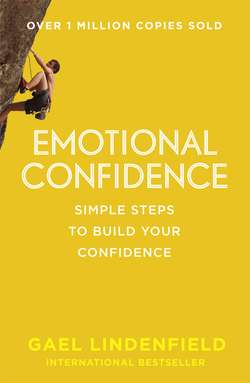Читать книгу Emotional Confidence: Simple Steps to Build Your Confidence - Gael Lindenfield, Gael Lindenfield - Страница 23
An Embarrassing Tale
ОглавлениеThis true story is a good illustration of my own primitive emotional centre leaping into action without consulting my ‘higher’, thinking brain.
One weekend I was walking with my husband in the depths of a large deserted forest at dusk when we heard a noise which sounded similar to a loud growl. Here’s my understanding of what must have happened internally – all within a split second of time and all without my conscious consent!
My brain picks up an auditory signal (‘Howl’):
→ senses its relevance to my well-being (‘Start emotional response’)
→ scans its emotional memory-bank and finds a pre-historic memory (‘Prowling wild animal!’)
→ scans for blueprints and finds one (‘Wild bears in deserted forest approaching unarmed fragile creatures!’)
→ reads instructions (‘Stay still, stay quiet and make hasty retreat!’)
→ declares emergency and sends message to direct limbic system (‘Crisis! Flight response required urgently’)
→ message to motor response department (‘Freeze limbs for .25 seconds please!’)
→ message to eyes (‘Open wide and scan field for best route out’)
→ message to the pituitary glands to secrete increase of adrenalin (‘Give extra strength to heart, lungs and legs as soon as eyes find route’)
→ message to sweat glands (‘Open up – let perspiration out – skin needs cooling’)
→ message to heart (‘Beat faster and divert blood supply to legs’)
→ message to respiratory department (‘Expand lungs and inhale deep breaths of oxygen’)
→ message to legs (‘Set in motion and head speedily back to civilization!’) Two minutes later, when traffic from nearby road is heard:
→ message to all emergency centres (‘Crisis over, fragile creatures now in sight of safety zone – relax and resume normal functioning’)
→ my thinking centre takes over the action (‘Try and make sense of that!)
→ major analysis of emotional concoction (relief – at not going to be eaten by wild animal; embarrassment – it was a forest in Hampshire – not a jungle!; disappointment – at being deprived of peaceful walk; anger – at self for reacting in such a ridiculously primitive manner; and guilt – due to jibes at husband for not being more reassuring)
→ sends an action message to my speech centre (‘Talk about the experience to husband, as he did an instant about turn too.’)
→ incident concludes with neat rationalization (‘It wasn’t that silly a reaction – after all there is a zoo nearby – it could have been an escaped animal: remember the story in last month’s paper!’)
A couple of weeks later when I was dipping into my literature on emotions to prepare for writing this chapter I was reminded that my primitive response has a long and noble history. It has saved the lives of countless generations of my protomammalian ancestors, so perhaps I should start being proud of it and more understanding when it makes the odd mistake!
